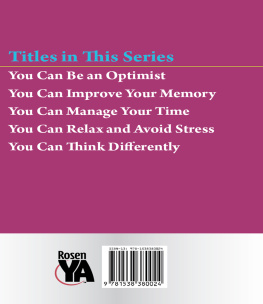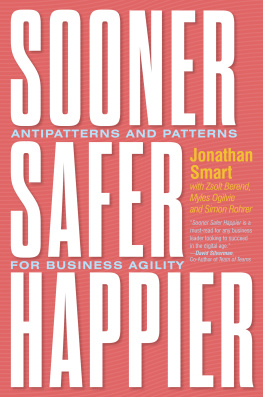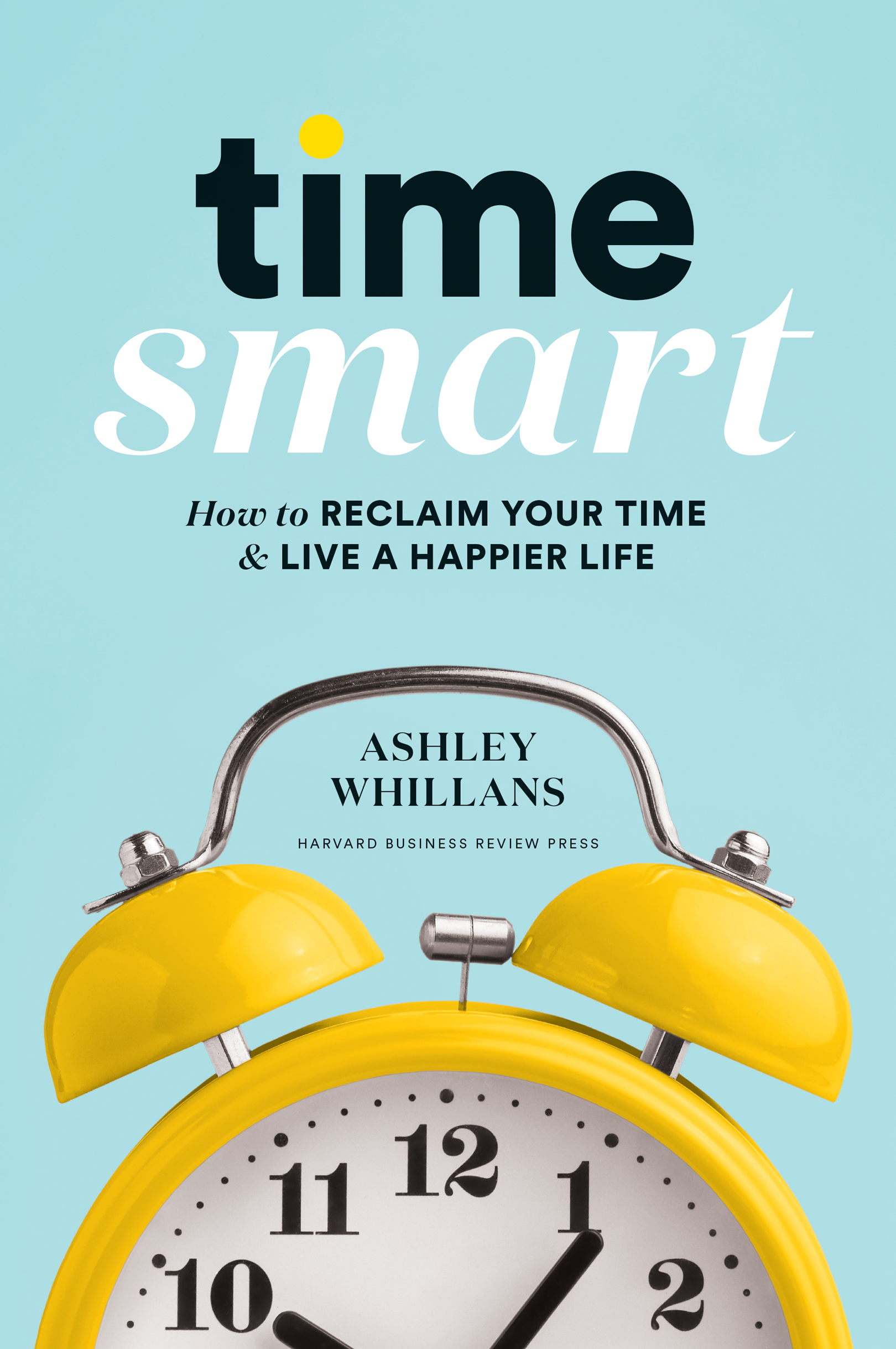Contents
Guide
Pagebreaks of the print version
time smart
How to RECLAIM YOUR TIME & LIVE A HAPPIER LIFE

ASHLEY WHILLANS
HARVARD BUSINESS REVIEW PRESS
BOSTON, MASSACHUSETTS
HBR Press Quantity Sales Discounts
Harvard Business Review Press titles are available at significant quantity discounts when purchased in bulk for client gifts, sales promotions, and premiums. Special editions, including books with corporate logos, customized covers, and letters from the company or CEO printed in the front matter, as well as excerpts of existing books, can also be created in large quantities for special needs.
For details and discount information for both print and
ebook formats, contact ,
tel. 800-988-0886, or www.hbr.org/bulksales.
Copyright 2020 Harvard Business School Publishing Corporation
All rights reserved
No part of this publication may be reproduced, stored in or introduced into a retrieval system, or transmitted, in any form, or by any means (electronic, mechanical, photocopying, recording, or otherwise), without the prior permission of the publisher. Requests for permission should be directed to , or mailed to Permissions, Harvard Business School Publishing, 60 Harvard Way, Boston, Massachusetts 02163.
The web addresses referenced in this book were live and correct at the time of the books publication but may be subject to change.
Library of Congress Cataloging-in-Publication Data
Names: Whillans, Ashley V., author.
Title: Time smart : how to reclaim your time and live a happier life / Ashley Whillans.
Description: Boston. MA : Harvard Business Review Press, [2020] | Includes index.
Identifiers: LCCN 2020012312 (print) | LCCN 2020012313 (ebook) | ISBN 9781633698352 (hardcover) | ISBN 9781633698369 (ebook)
Subjects: LCSH: Time management. | Happiness.
Classification: LCC HD69.T54 W46 2020 (print) | LCC HD69.T54 (ebook) | DDC 650.1/1dc23
LC record available at https://lccn.loc.gov/2020012312
LC ebook record available at https://lccn.loc.gov/2020012313
ISBN: 978-1-63369-835-2
eISBN: 978-1-63369-836-9
For my partner, my family, and my friends, all of whom have taught me the true value of time.

CONTENTS
- Learn whether you value time or money more, and why it matters
- Start to calculate the time cost of daily decisions
- Identify six traps making you time poor, including technology and the wealth paradox
- Toolkit:Recognize and overcome your personal time traps
- Learn five ways to alleviate your time poverty, including finding time and funding it
- Toolkit:Track how you spend time, and find more of it
- Build time-smart routines into your daily life
- Toolkit:Create intentions and plan to follow through
- Navigate major life decisions, including choosing jobs and where to live, in a time-smart way
- Toolkit:Plan ahead and rethink costs and benefits with time in mind
- Help create broader change
- Share this chapter with HR leaders and policy makers
- Begin your time-smart journey
- Be part of a world thats time smart for everyone
- Keep time in mind with your time-smart checklist
INTRODUCTION
the art and science of being time smart
Time and money. They share a lot in common: both are measurable, and both are scarce. Both are what most of us would say are the most valuable things we can have. We want more time and we want more money, and we work to get them.
But as young adults, we learn quickly that for all their similarities, time and money are set against each other, and it seems to stay that way for the rest of our working lives. Its difficult to gain as much of both as we want. Mostly, were choosing between them, making trade-offs. The old aphorismif you have the money you dont have the time, and if you have the time you dont have the moneyseems true. Over and over we find ourselves choosing between time and money. Cook or eat out? Work or go on vacation? Find a second job or spend more time with the kids?
I became fascinated with the trade-offs people make between time and money when I was a PhD student, in part because a PhD students life is a conscious choice to trade money for time, to spend years becoming an expert on new ideas with very little financial reward. To quell my curiosity, I surveyed thousands of working adults around the worldfrom Danish millionaires to working parents and single moms living day by day in the United States, East Africa, and Indiaabout these two very simple, universally valuable resources: time and money.
What surprised me most about peoples answers was the disconnect between how important many of these time and money decisions were and how trivial they seemed in the moment. These trade-offs are so seemingly dull or obvious, we often dont even realize were making them. Again and again in my research, and in my life (because once you start paying attention to this topic, you cant escape it; its the lens through which you see people and their choices), Ive heard stories about the decisions people make about time and money. These stories show that these decisions sneak up on us, and that any given choicewhether its a big decision like what career to choose or a tiny decision like whether to use those last two vacation daysseems to be inconsequential and easy to reverse. But it is not. All these decisions powerfully shape the happiness we derive from moments, from days, from our entire lives.
These decisions affect everyonenot only the financially affluent. If anything, people with fewer means have more to gain by thinking critically about how they make decisions about time and money. Some of the examples I discuss in this book involve professionals and the well-to-doincluding millionairesbut others illustrate the trade-offs faced by single moms in developing countries who are living day by day. I also share stories of companies helping diverse groups of people effectively navigate time and money trade-offsfrom Silicon Valley companies offering computer engineers housecleaning services to a startup helping the poorest Americans save time by transforming their commutes. In my research, almost everyone, from CEOs to students to working parents, face trade-offs between time and money and can improve their decision making in the moments when they choose.
Time and Money in Daily Life
Several stories from my research stick with me as prototypical of those facing time and money decisions.
Nicole was a newly minted executive at a major credit card company. Thomas, her husband, was a busy VP. They were rarely in the same city and hadnt taken a vacation together in years. One day, Thomas received a pleasant surprise: courtesy of a generous client, he was offered the chance to extend his work trip by a week and enjoy the Swiss Alps, all expenses paid. This was a once-in-a-lifetime opportunity. Thomas pleaded with his wife. Nicole, please come. Its only for a few days. Nicole sighed and said, I cant. I have an important meeting that I shouldnt miss. Thomas hit the slopes with his sister Leah instead, and the siblings enjoyed what they both deemed the best trip ever.












